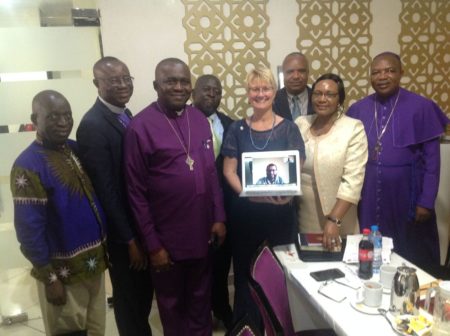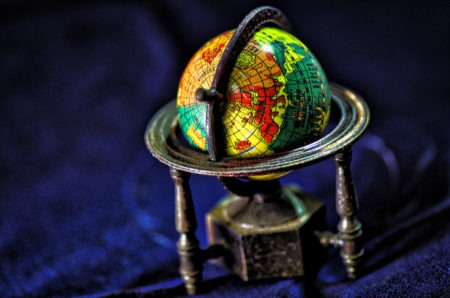Have you ever seen a sonogram of an unborn child? The technology today is absolutely amazing! It transforms a pregnant abdomen from an unknown experience into the carrier of God’s creation.
We can’t always see what God is creating in our lives or through our lives. We’re like pre-sonogram people. We know something’s happening because life is always unfolding. We just can’t see deeply enough to know exactly what’s going on.
That is why Mary’s story is so amazing. I’m talking about Mary, the Mother of Jesus – the one who’s labor culminated in the birth we celebrate on Christmas day. You can find her story in Luke 1.26-38.
Do you remember the Beatles’ song Let it Be? Most of us – of a certain age – remember at least the first part.
When I find myself in times of trouble, mother Mary comes to me
Speaking words of wisdom, let it be
And in my hour of darkness, she is standing right in front of me
Speaking words of wisdom, let it be.
But do you remember the next verse?
When the brokenhearted people, living in the world agree
There will be an answer, let it be
For though they may be parted, there is still a chance that they will see
There will be an answer, let it be.
Who would have thought – especially in 1970 – that God would use Paul McCartney to further God’s kingdom message? I’m pretty confident the church didn’t! But there it is: though they may be parted, there is still a chance that they will see. There will be an answer – let it be…
The good news of the kingdom of God is that when God became human in Jesus of Nazareth, all the barriers that separate, all the walls that keep us estranged from God and one another, have been torn down. The answer we and all the world need to see is that we are no longer parted. In Jesus Christ we are reconciled – all of creation is reconciled with God!
That is why Mary’s story is so important. Mary was a theotokos – that’s the Greek word for Godbearer. [1] Now you are probably saying DUH! Of course, she was a Godbearer, she had the baby Jesus and laid him in the manger – that’s what we just celebrated. But here is a deeper truth: Mary’s story isn’t important simply because she gave birth to the baby Jesus (even though that is a very big deal). Mary’s story is important because she shows us how we are to be Godbearers as well.
Let me reassure you, I’m not talking about having babies. I’m talking about being a theotokos – a Godbearer, each of us. In a world filled with brokenness and estrangement, poverty, violence and death, we need Godbearers.
Here is a reality check as we move forward from the Christmas event: Mary may have been the first Godbearer. She may have been the ultimate Godbearer. But if you are in relationship with Jesus Christ, then you are a Godbearer too. Everyone who follows in the Jesus way is called to be a Godbearer. That is a huge part of what it means to follow Jesus – bearing God to others.
We can learn a lot from Mary, but three things stand out about her as a theotokos – a Godbearer: she bore God within herself, she bore God to others through her faithful witness in word and deed, and she bore the suffering of others. [2] Those three things provide the paradigm for our Godbearing: we bear God within, we bear faithful witness to God through our words and actions, and we bear the suffering of others.
One of our claims as Christians is that Mary is the only human being to have literally borne God within. Robert Jenson says that Mary makes a “space for God.” “Her womb is the container of the uncontainable.”[3] We tend to take that openness for granted, but think about it. Mary was a teenager, pregnant and unmarried – not an easy combination in our day and age, but even more so in Mary’s day – actually a deadly combination for her given the law of Torah.
That makes Mary’s response to Gabriel worthy of a second look: Here I am. I’m a servant of Lord. Let it be with me according to your word. This isn’t passive resignation. This isn’t the “whatever” of a typical teenager. This is the quiet strength of someone who freely assents to God’s choice to use her to inaugurate God’s kingdom.
The words she uses are important. She calls herself God’s doulē. Most translations use the word “servant,” but the Greek word literally means “slave.” That word may make us uncomfortable, but it moves us closer to what is happening. Mary isn’t choosing to serve. That is frequently the way we think of Christian service; I choose when to volunteer my time, how much money I will give and where that money will go. We like to be in control of how we serve.
But Mary has been chosen to serve. This way of serving wasn’t her idea. So what Mary does is freely assent to God’s plan and God’s authority. Let it be with me according to your word. Tim Perry is helpful in understanding what is happening, “If Mary is God’s slave then she is no one else’s – not even her husband’s. God calls, Mary assents, the redeemer is conceived and Joseph is not even a witness to the events.”[4]
The ironic thing about being a servant of God is that in choosing Mary, God opens space for Mary to act, speak and decide. She isn’t simply someone’s property (as wives and fiancés were in those days). Mary has been empowered. She has free will and agency and she uses that power to freely assent to the way of the Godbearer – let it be…
This is important for us as we seek to bear God within. It is about making space within ourselves for God. God’s grace comes to us as a gift freely given. God opens up space for us to act, speak and decide. God empowers us with free will and agency. We respond to that grace by making space within ourselves – let it be…
When we freely respond, we become God’s servants – God’s doulēs; but rather than being oppressive, that service is liberating and self-fulfilling. If we’re God’s doulēs,then we can’t be anyone else’s – no matter what messages society may send us.The fact that God chooses Mary in the first place indicates that God doesn’t play by the rules of society. Service to God clearly allows for all kinds of initiative in the face of social convention – that’s why Mary could just take off and go to Elizabeth’s house by herself, with no chaperone, with no one’s permission. That was pretty radical behavior – but hey! When you’re God’s doulē you’re nobody else’s.
Mary’s story tells us that anyone can become a participant in the life-centered activity of God in the world – as long as you are open to possibility, as long as you choose to respond, as long as you are willing to be changed in the process.
So we bear God within. We respond to God’s grace by making space for God within ourselves, freely assenting to God’s lordship in our lives – let it be…
But Mary as theotokos, also shows us a second aspect of Godbearing: faithful witness. Shortly after Gabriel leaves, Mary goes to visit Elizabeth. That was a radical act of witness in and of itself. While she is there she sings what we know as the Magnificat or Mary’s Song of Praise. (Luke 1:46-56) This is Mary’s prophetic witness to the message and ministry of Jesus. Jesus the Christ brings mercy. Jesus the Christ brings down the powerful and lifts up the lowly. Jesus the Christ fills the hungry with good things and sends the rich away empty.
Did you know that in the 1980’s the government of Guatemala banned any public reciting of Mary’s Magnificat? They deemed it too politically subversive. And all this time we’ve relegated Mary to a stable in December.
It is no wonder so many people find comfort in Mary. She is a symbol of strength and hope for poor and oppressed people everywhere. Her witness tells us that faithfulness to God doesn’t mean our lives will be perfect, or painless, or predictable; but her witness show just how powerful our words and lives can be when we receive and share the life of God. Let it be…
The third aspect of Godbearing we see in Mary is the willingness to bear the suffering of others. In so many beautiful renderings of the Pieta, Mary bears the broken body of her crucified son on her lap – the Messiah Jesus, the Incarnate One, fully human – one of us. Mary stayed with Jesus to the bitter end. She didn’t run away when he was experiencing an excruciating death on the cross. She remained steadfast when he was humiliated and abandoned by almost all of his followers.
Godbearers cradle the brokenness of others in their arms and share in their suffering at the hands of a death-dealing world. As Christ followers, we cradle the brokenness of others and share in their suffering at the hands of a death-dealing world. Let it be…
Bearing God within, bearing witness through our words and actions, bearing the suffering of others, this shouldn’t be news to us. This kind of Godbearing is the way it has been for over 2000 years. This kind of Godbearing is what it means to follow in the Jesus way.
But bearing God within doesn’t just happen. It takes commitment – commitment to things like Bible study or small groups, things like Emmaus Walks or other opportunities to have the renewed image of God blossom within you. If you want your congregation to grow, start by looking within yourself. Are you in a small group? Or a bible study? Following Jesus Christ isn’t just about showing up every week or so on Sunday. It’s about attending to the growth of our spirits; it’s about making space for God within ourselves through prayer, and study, and spiritual conversation.
Bearing faithful witness takes effort too. It’s easy to answer the question “Do you want your church to grow?” Of course, we do! Everybody wants their church to grow. The harder question is are we willing to do the things that are necessary for our church to grow? That’s an entirely different thing. One of those things is bearing faithful witness. We do that in our daily lives, the way we treat others, the stands we take on sensitive and important issues, how willing we are to speak out on behalf of those who have no voice or to stand with those who lack support. We bear faithful witness when we share our personal stories of faith, what Jesus Christ means to us and how we’ve experienced the Holy Spirit working in our lives.
We bear faithful witness when we worship together – especially when that worship is dynamic and infused with the power of the Holy Spirit. Especially when that worship is focused not on us and on our own likes or our own needs or our own preferences; but when our worship is focused on God and focused on enabling others – especially those others who aren’t here yet – to experience the presence of the living God for themselves.
And bearing the suffering of others. Big surprise! The Christian life takes effort. If anybody told you following Jesus was no big deal they were either full of *** or lying. Following Jesus is work. It’s work because it requires that we stand in solidarity with those who don’t have enough, to pray and intercede and visit the sick and care for the dying and bind up the broken – to cradle in our own arms all those who suffer at the hands of a death-dealing world.
Mary is our prototype. Let it be according to your words. Each of us has to bear God in our own life. How will you do it? How will you bear God within? What change will you need to make to be God’s doulē and no one else’s? How will you bear faithful witness? Whose suffering will you bear?
Each of us is to be a theotokos – a Godbearer. I pray that it would be so…AMEN.
[1] I am grateful to Orthodox theologian, Kallistos Ware for his assertion that the term Theotokos is more accurately translated “Godbearer” than “Mother of God.”
[2] I am grateful to Elaine Robinson the three-fold description of Godbearing.
[3] Robert Jenson, “A Space for God,” Mary, Mother of God, ed. Carl E. Braaten & Robert W. Jenson (Grand Rapids: Eerdmans, 2004) 51.
[4] Tim Perry, Mary for Evangelicals: Toward an Understanding of the Mother of Our Lord (Downers Grove: IVP Academic, 2006) 73.
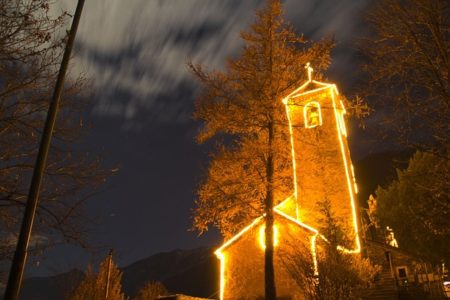
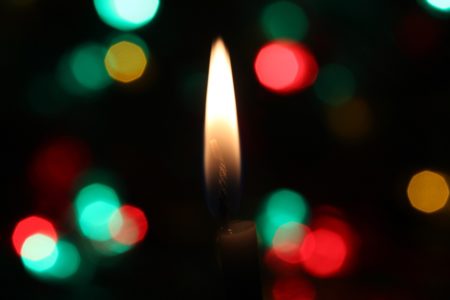

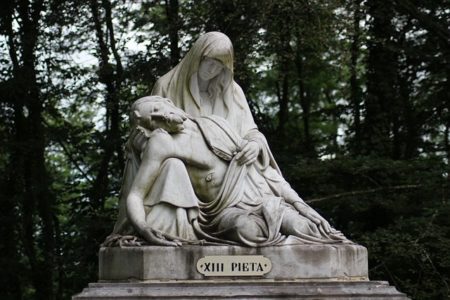
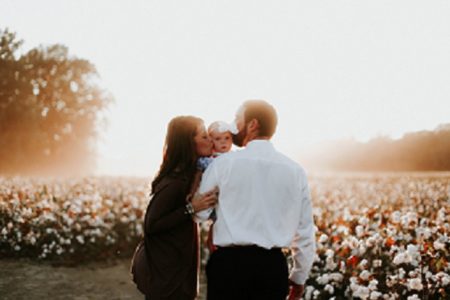



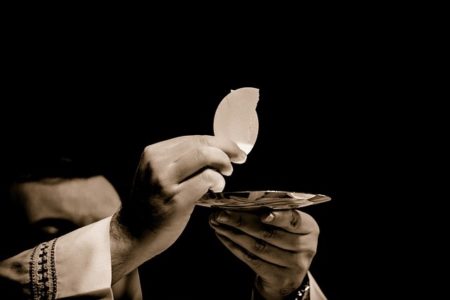

 There is no gate on the US side. But for a while, though separated by wire and watched by US border patrol officers, families can talk, clasping fingers through the small gaps, connecting across the barrier that divides them.
There is no gate on the US side. But for a while, though separated by wire and watched by US border patrol officers, families can talk, clasping fingers through the small gaps, connecting across the barrier that divides them.
